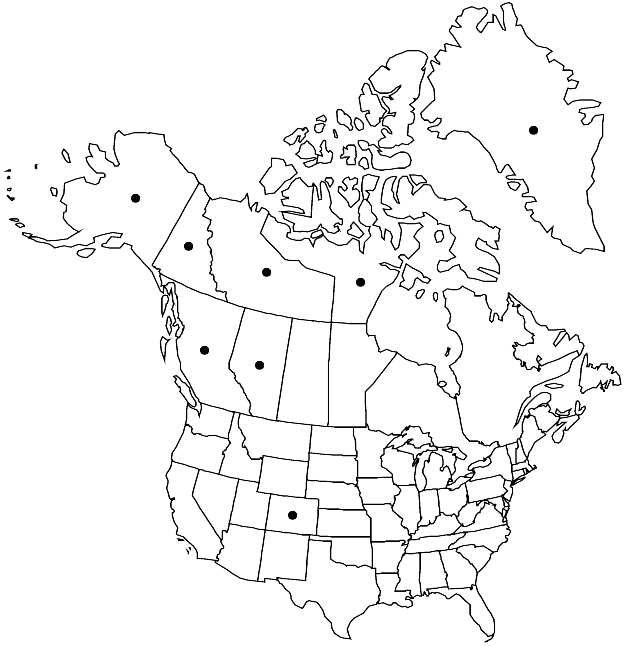Hypnum hamulosum
in P. Bruch and W. P. Schimper, Bryol. Europ. 6: 96, plate 590. 1854.
Plants small, in tufts, yellowish. Stems 2–9 cm, yellowish, erect, not complanate-foliate, pinnate to irregularly branched, branches 0.4–0.8 cm; hyalodermis present, central strand weak; pseudoparaphyllia foliose. Stem-leaves strongly hamate and falcate-secund, ovatelanceolate, gradually tapering to insertion, gradually narrowed to apex, 1.3–1.5 × 0.4–0.5 mm; base sometimes weakly decurrent; margins plane, usually entire, weakly toothed toward apex; apex narrowly acuminate; costa double, short or sometimes to 1/2 leaf length; alar region rarely differentiated except at margin and near insertion, with 2 or 3 slightly larger, thin-walled cells; basal laminal cells shorter, broader than medial cells, unpigmented, walls not pitted; medial cells 40–60 (–70) × 3–4 µm. Sexual condition phyllodioicous; inner perichaetial leaves ovatelanceolate, margins toothed distally, apex attenuate. Seta reddish, 1–2 cm. Capsule inclined to horizontal, brown, long-cylindric, 1.5–1.8 mm; annulus 2-seriate or 3-seriate; operculum conic; endostome cilia 1 or 2.
Phenology: Capsules mature Jul–Aug.
Habitat: Calcareous rock, in crevices, tundra, mountains
Elevation: elevation unknown
Distribution

Greenland, Alta., B.C., N.W.T., Nunavut, Yukon, Alaska, Colo., Europe, Asia
Discussion
Hypnum hamulosum resembles the related species H. callichroum, H. holmenii, and H. plicatulum, especially the last two, but is distinguished by its strongly hamate stem leaves that generally do not taper to the base or have differentiated alar cells. Because branch leaves are not diagnostic, tundra forms can be impossible to name with confidence; these often possess only branch leaves, as the main stem is not present. Many reports of H. hamulosum from North America are based on such specimens. Plants of H. hamulosum have scarce pseudoparaphyllia. The capsules are infrequent, with opercula 0.5 mm and smooth endostome cilia.
Selected References
None.